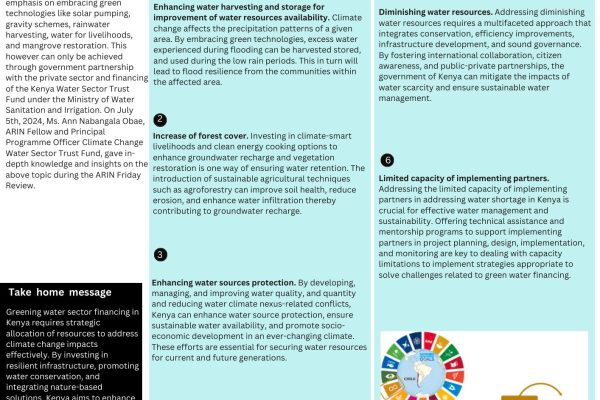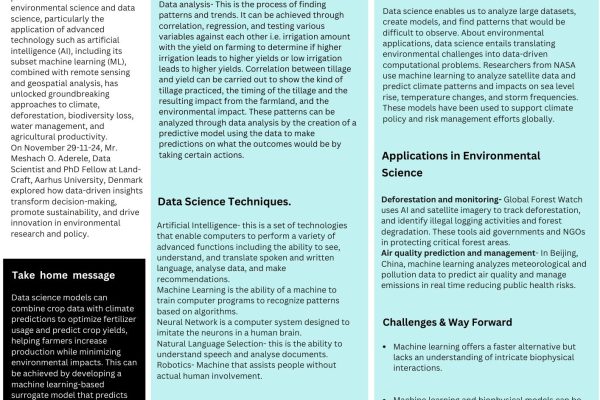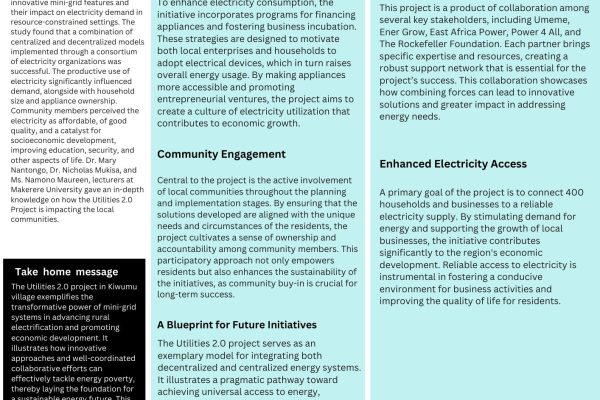Introduction.
As the world accelerates towards a renewable energy future, Africa is at a crossroads. While developed nations actively invest in clean energy, the continent lags, hindered by limited policies and funding. Ironically, Africa is also experiencing a surge in fossil discoveries, presenting a unique challenge. Countries like Botswana, Uganda, Namibia, Mozambique, and Tanzania are rich in oil and gas reserves, yet these nations struggle with some of the lowest electricity access rates on the continent. The global push for energy transition raises a critical question; How can Africa harness its abundant fossil fuel resources while ensuring a just and equitable transition to renewable energy? Mr Sammy Jamar, energy consultant and Arin Fellow gave an in-depth analysis on the above topic on August 30, 2024, during the Arin Friday review.
Key Messages.
Policy and Governance
At the heart of effective management of Africa’s rich natural resources lies a robust framework of governance and policy-making. Such frameworks are essential for nurturing prosperity that is equitable and sustainable. The formulation and implementation of cohesive pan-African industrial policies are vital, as they promote a collective vision for development while ensuring the continent’s energy independence. By concentrating efforts on these pivotal areas, Africa can initiate a transformative energy transition that not only aims to curtail carbon emissions but also aspires to build a resilient and flourishing future for its citizens. This journey involves multistakeholder collaboration, innovative solutions, and an unwavering commitment to involving communities in the decision-making process.
Addressing Infrastructure Challenges
One of the most pressing challenges that Africa faces in expanding energy access is its insufficient infrastructure. The successful enhancement of energy infrastructure is crucial for delivering reliable and consistent electricity to underserved populations. This endeavor includes the construction of new power generation facilities, modernizing existing power grids, and heavily investing in the expansion of transmission and distribution networks. By ensuring that these critical systems are both reliable and affordable, Africa can make significant headway in alleviating energy poverty, boosting living standards, and cultivating sustainable development across the continent. To navigate these complex challenges, a collaborative approach that embraces innovation and emphasizes inclusivity is essential. It necessitates active community involvement, the application of cutting-edge technologies, and strategic investments that prioritize long-term benefits for all.
Implementing Government Policies and Programs
Governments in Africa have a substantial opportunity and responsibility to foster energy access and sustainability through the implementation of thoughtful policies and programs. By tailoring initiatives that uplift renewable energy investments, they can create a welcoming environment for both local and foreign investment. This can include introducing attractive financial incentives that encourage private sector participation and establishing clear, transparent regulatory frameworks that protect consumers while fostering business growth. Moreover, it is crucial that energy projects consider the needs and rights of marginalized communities, ensuring that no one is left behind. Governments should also engage in campaigns that raise public awareness about the benefits of renewable energy, empowering citizens to adopt sustainable practices and actively partake in energy initiatives.
International Support and Collaboration
Addressing energy poverty in Africa is a complex challenge that requires international collaboration and support. Forming robust global partnerships can be instrumental in driving progress in the energy sector. Engaging with international organizations, donor nations, and private investors can unlock vital funding sources, provide technical expertise, and bolster capacity-building initiatives tailored for local energy projects. These collaborative endeavours should focus on sharing knowledge, exchanging best practices, and pooling resources to maximize impact. By fostering a shared commitment to sustainable energy development, the global community can significantly contribute to dismantling the barriers that currently hinder energy access throughout the continent.
Conclusion
Achieving a successful energy transition in Africa necessitates a delicate balance between harnessing fossil fuel wealth and ambitiously advancing renewable energy initiatives. The continent is endowed with an abundance of renewable resources, including vast solar energy potential and powerful wind currents. By strategically tapping into these natural riches, Africa can meet its increasing energy demands while gradually reducing its reliance on fossil fuels. This transition holds the promise of not only bolstering economic development but also preserving environmental integrity and promoting social equity. Ultimately, a united effort involving governments, the private sector, international allies, and local communities will be crucial in laying the foundation for a sustainable and equitable energy landscape that ensures prosperity for all Africans.




